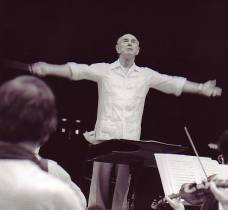
Erich Leinsdorf (born Erich Landauer) (February 4, 1912 – September 11, 1993) was an Austrian-born American conductor. He performed and recorded with leading orchestras and opera companies throughout the United States and Europe, earning a reputation for exacting standards as well as an acerbic personality. He also published books and essays on musical matters. Leinsdorf was born in Vienna, and was studying music at a local school by the age of 5. He studied conducting at the Mozarteum in Salzburg, and later at the University of Vienna and the Vienna Academy of Music. From 1934 to 1937 he worked as an assistant to Bruno Walter and Arturo Toscanini at the Salzburg Festival. He conducted at the Metropolitan Opera in New York City from 1938, being particularly noted for his Wagner; after the sudden death of Artur Bodanzky in 1939, Leinsdorf was named the Met's "head of German repertoire". In 1942 Leinsdorf became a naturalized American citizen. From 1943 he had a brief three-year post as Music Director of the Cleveland Orchestra, but was absent for much of this tenure because he was drafted into the United States Armed Forces for World War II; the orchestra did not renew Leinsdorf's contract. Many years later, in the transition in Cleveland from Lorin Maazel to Christoph von Dohnányi between 1982 and 1984, Leinsdorf returned to lead several concerts; Leinsdorf described his role as "the bridge between the regimes". He was the principal conductor of the Rochester Philharmonic Orchestra from 1947 to 1955. Leinsdorf came to despair of what he saw as Rochester's insular musical culture, famously remarking that "Rochester is the best disguised dead end in the world!" Subsequently he was briefly head of the New York City Opera, before resuming his association with the Met. In 1962 he was named music director of the Boston Symphony Orchestra. His time in Boston would produce many recordings for RCA, but was also marked by controversy, as he occasionally clashed with musicians and administrators. More than once Leinsdorf's performances were interrupted by historical events. On November 22, 1963, during a performance of the Boston Symphony Orchestra, he delivered this sad news: "Ladies and Gentlemen, we have a press report over the wires ... We hope that it is unconfirmed but we have to doubt it ... that the President of the United States has been victim ... of an assassination. [audience gasps and murmurs loudly] We will play the Funeral March from Beethoven's third symphony." He was referring to the assassination of President John F. Kennedy in Dallas, Texas. In the middle of conducting a concert series with the Israel Philharmonic Orchestra in 1967, Leinsdorf abruptly fled the country at the start of the Six-Day War; he left so hurriedly that he even forgot to take his tuxedo. Upon Leinsdorf's sudden departure, Zubin Mehta went to conduct the orchestra during the war. In 1969 Leinsdorf left the Boston post. He would continue to guest-conduct operas and orchestras around the world for the next two decades, being particularly associated with the Metropolitan Opera and the New York Philharmonic. He also served from 1978 to 1980 as principal conductor of the (West) Berlin Radio Symphony Orchestra. He died of cancer in Zürich, Switzerland, at the age of 81.
Увы, но информации о Милларде Тэйлоре, солирующем в Скрипичном концерте, я не нашёл. Могу только сказать, что он некоторое время играл в Eastman Piano Quartet.
Smetana: Overture to the "Bartered Bride"
Dvorak: Part II from Symphony No.6
Martinu: Violin Concerto (Millard Taylor, violin)
Weinberger: Polka and Fugue from "Schwanda the Bagpiper"
Rochester Philharmonic Orchestra
Conductor: Erich Leinsdorf
Rec.: April 16, 1949 (Eastman Theatre)
| 
